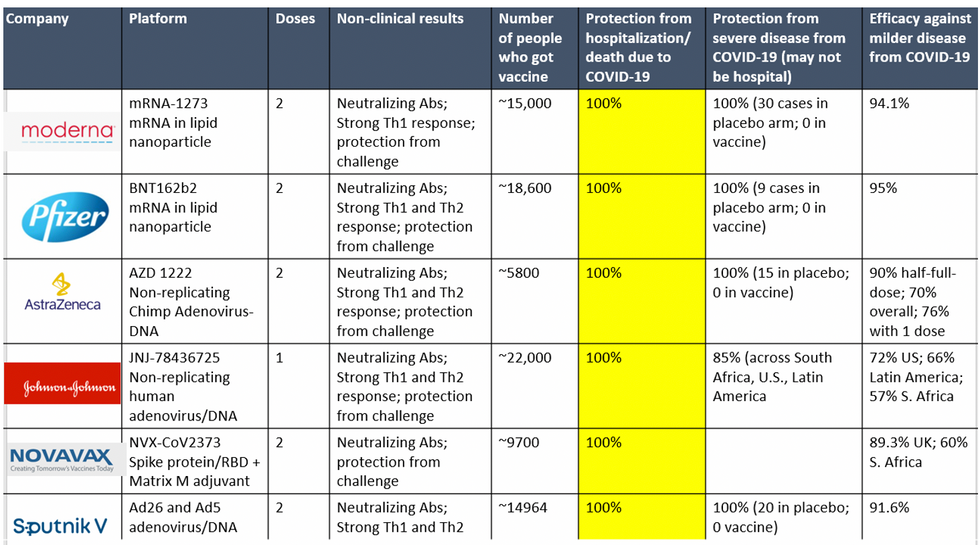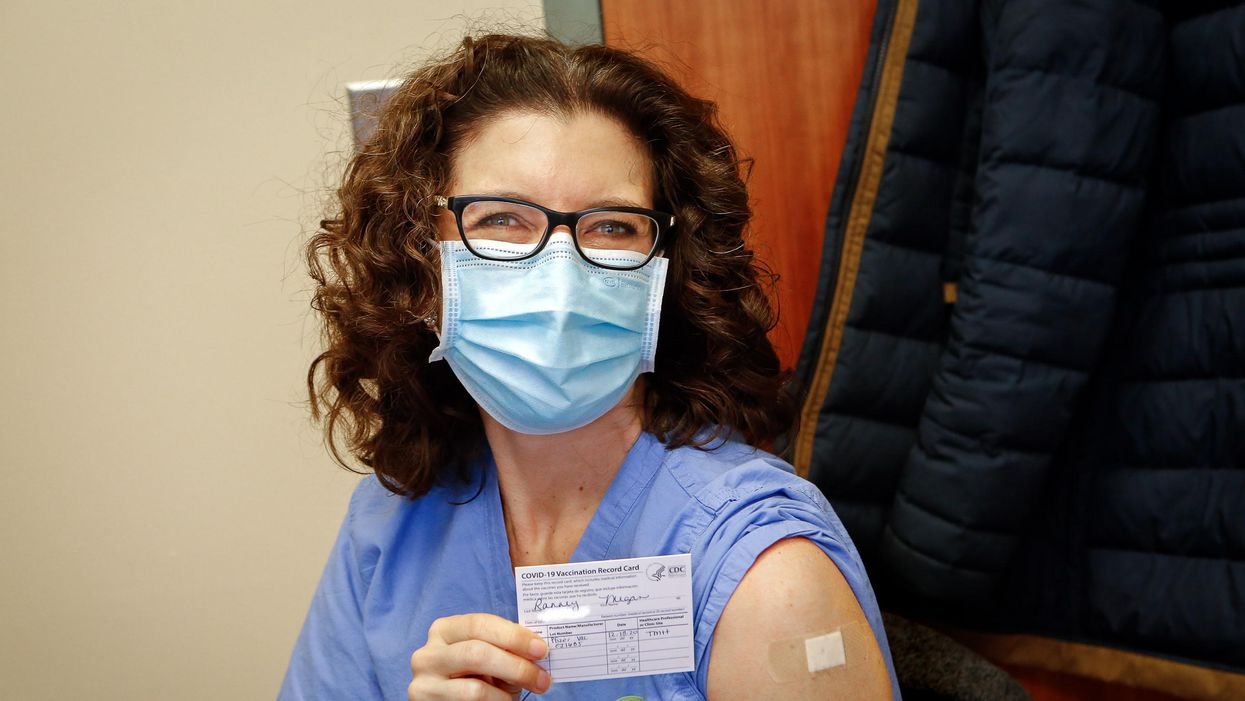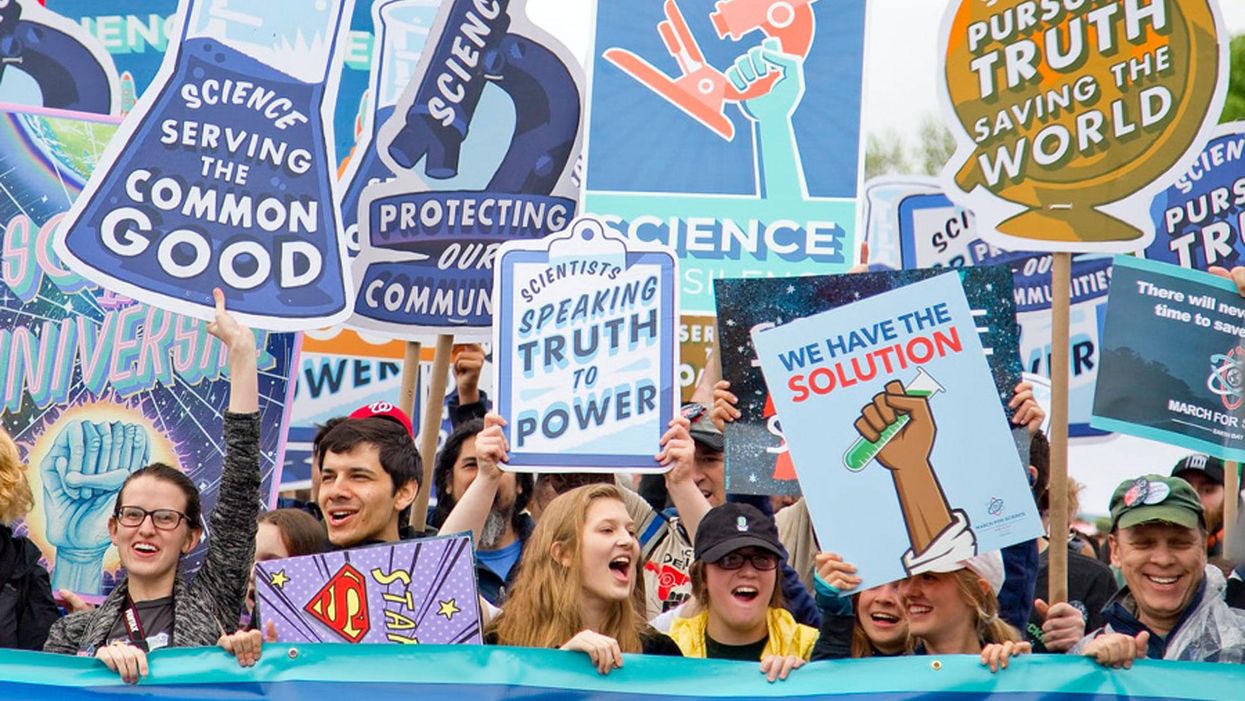Want to Motivate Vaccinations? Message Optimism, Not Doom
There is a lot to be optimistic about regarding the new safe and highly effective vaccines, which are moving society closer toward the goal of close human contact once again.
After COVID-19 was declared a worldwide pandemic by the World Health Organization on March 11, 2020, life as we knew it altered dramatically and millions went into lockdown. Since then, most of the world has had to contend with masks, distancing, ventilation and cycles of lockdowns as surges flare up. Deaths from COVID-19 infection, along with economic and mental health effects from the shutdowns, have been devastating. The need for an ultimate solution -- safe and effective vaccines -- has been paramount.
On November 9, 2020 (just 8 months after the pandemic announcement), the press release for the first effective COVID-19 vaccine from Pfizer/BioNTech was issued, followed by positive announcements regarding the safety and efficacy of five other vaccines from Moderna, University of Oxford/AztraZeneca, Novavax, Johnson and Johnson and Sputnik V. The Moderna and Pfizer vaccines have earned emergency use authorization through the FDA in the United States and are being distributed. We -- after many long months -- are seeing control of the devastating COVID-19 pandemic glimmering into sight.
To be clear, these vaccine candidates for COVID-19, both authorized and not yet authorized, are highly effective and safe. In fact, across all trials and sites, all six vaccines were 100% effective in preventing hospitalizations and death from COVID-19.
All Vaccines' Phase 3 Clinical Data

Complete protection against hospitalization and death from COVID-19 exhibited by all vaccines with phase 3 clinical trial data.
This astounding level of protection from SARS-CoV-2 from all vaccine candidates across multiple regions is likely due to robust T cell response from vaccination and will "defang" the virus from the concerns that led to COVID-19 restrictions initially: the ability of the virus to cause severe illness. This is a time of hope and optimism. After the devastating third surge of COVID-19 infections and deaths over the winter, we finally have an opportunity to stem the crisis – if only people readily accept the vaccines.
Amidst these incredible scientific advancements, however, public health officials and politicians have been pushing downright discouraging messaging. The ubiquitous talk of ongoing masks and distancing restrictions without any clear end in sight threatens to dampen uptake of the vaccines. It's imperative that we break down each concern and see if we can revitalize our public health messaging accordingly.
The first concern: we currently do not know if the vaccines block asymptomatic infection as well as symptomatic disease, since none of the phase 3 vaccine trials were set up to answer this question. However, there is biological plausibility that the antibodies and T-cell responses blocking symptomatic disease will also block asymptomatic infection in the nasal passages. IgG immunoglobulins (generated and measured by the vaccine trials) enter the nasal mucosa and systemic vaccinations generate IgA antibodies at mucosal surfaces. Monoclonal antibodies given to outpatients with COVID-19 hasten viral clearance from the airways.
Although it is prudent for those who are vaccinated to wear masks around the unvaccinated in case a slight risk of transmission remains, two fully vaccinated people can comfortably abandon masking around each other.
Moreover, data from the AztraZeneca trial (including in the phase 3 trial final results manuscript), where weekly self-swabbing was done by participants, and data from the Moderna trial, where a nasal swab was performed prior to the second dose, both showed risk reductions in asymptomatic infection with even a single dose. Finally, real-world data from a large Pfizer-based vaccine campaign in Israel shows a 50% reduction in infections (asymptomatic or symptomatic) after just the first dose.
Therefore, the likelihood of these vaccines blocking asymptomatic carriage, as well as symptomatic disease, is high. Although it is prudent for those who are vaccinated to wear masks around the unvaccinated in case a slight risk of transmission remains, two fully vaccinated people can comfortably abandon masking around each other. Moreover, as the percentage of vaccinated people increases, it will be increasingly untenable to impose restrictions on this group. Once herd immunity is reached, these restrictions can and should be abandoned altogether.
The second concern translating to "doom and gloom" messaging lately is around the identification of troubling new variants due to enhanced surveillance via viral sequencing. Four major variants circulating at this point (with others described in the past) are the B.1.1.7 variant ("UK variant"), B.1.351 ("South Africa variant), P.1. ("Brazil variant"), and the L452R variant identified in California. Although the UK variant is likely to be more transmissible, as is the South Africa variant, we have no reason to believe that masks, distancing and ventilation are ineffective against these variants.
Moreover, neutralizing antibody titers with the Pfizer and Moderna vaccines do not seem to be significantly reduced against the variants. Finally, although the Novavax 2-dose and Johnson and Johnson (J&J) 1-dose vaccines had lower rates of efficacy against moderate COVID-19 disease in South Africa, their efficacy against severe disease was impressively high. In fact J&J's vaccine still prevented 100% of hospitalizations and death from COVID-19. When combining both hospitalizations/deaths and severe symptoms managed at home, the J&J 1-dose vaccine was 85% protective across all three sites of the trial: the U.S., Latin America (including Brazil), and South Africa.
In South Africa, nearly all cases of COVID-19 (95%) were due to infection with the B.1.351 SARS-CoV-2 variant. Finally, since herd immunity does not rely on maximal immune responses among all individuals in a society, the Moderna/Pfizer/J&J vaccines are all likely to achieve that goal against variants. And thankfully, all of these vaccines can be easily modified to boost specifically against a new variant if needed (indeed, Moderna and Pfizer are already working on boosters against the prominent variants).
The third concern of some public health officials is that people will abandon all restrictions once vaccinated unless overly cautious messages are drilled into them. Indeed, the false idea that if you "give people an inch, they will take a mile" has been misinforming our messaging about mitigation since the beginning of the pandemic. For example, the very phrase "stay at home" with all of its non-applicability for essential workers and single individuals is stigmatizing and unrealistic for many. Instead, the message should have focused on how people can additively reduce their risks under different circumstances.
The public will be more inclined to trust health officials if those officials communicate with nuanced messages backed up by evidence, rather than with broad brushstrokes that shame. Therefore, we should be saying that "vaccinated people can be together with other vaccinated individuals without restrictions but must protect the unvaccinated with masks and distancing." And we can say "unvaccinated individuals should adhere to all current restrictions until vaccinated" without fear of misunderstandings. Indeed, this kind of layered advice has been communicated to people living with HIV and those without HIV for a long time (if you have HIV but partner does not, take these precautions; if both have HIV, you can do this, etc.).
Our heady progress in vaccine development, along with the incredible efficacy results of all of them, is unprecedented. However, we are at risk of undermining such progress if people balk at the vaccine because they don't believe it will make enough of a difference. One of the most critical messages we can deliver right now is that these vaccines will eventually free us from the restrictions of this pandemic. Let's use tiered messaging and clear communication to boost vaccine optimism and uptake, and get us to the goal of close human contact once again.
Everyone Should Hear My COVID Vaccine Experience
Dr. Ranney immediately after receiving her first dose of the Pfizer vaccine on December 18, 2020.
On December 18th, 2020, I received my first dose of the Pfizer mRNA vaccine against SARS-CoV-2. On January 9th, 2021, I received my second. I am now a CDC-card-carrying, fully vaccinated person.
The build-up to the first dose was momentous. I was scheduled for the first dose of the morning. Our vaccine clinic was abuzz with excitement and hope, and some media folks were there to capture the moment. A couple of fellow emergency physicians were in the same cohort of recipients as I; we exchanged virtual high-fives and took a picture of socially distanced hugs. It was, after all, the closest thing we'd had to a celebration in months.
I walked in the vaccine administration room with anticipation – it was tough to believe this moment was truly, finally here. I got a little video of my getting the shot, took my obligate vaccine selfie, waited in the observation area for 15 minutes to ensure I didn't have a reaction, and then proudly joined 1000s of fellow healthcare workers across the country in posting #ThisIsMyShot on social media. "Here we go, America!"
The first shot, though, didn't actually do all that much for me. It hurt less than a flu shot (which, by the way, doesn't hurt much). I had virtually no side effects. I also knew that it did not yet protect me. The Pfizer (and Moderna) data show very clearly that although the immune response starts to grow 10-12 days after the first shot, one doesn't reach full protection against COVID-19 until much later.
So when, two days after my first shot, I headed back to work in the emergency department, I kept wondering "Will this be the day that I get sick? Wouldn't that be ironic!" Although I never go without an N95 during patient care, it just takes one slip – scratching one's eyes, eating lunch in a break room that an infected colleague had just been in – to get ill. Ten months into this pandemic, it is so easy to get fatigued, to make a small error just one time.
Indeed, I had a few colleagues fall ill in between their first and second shots; one was hospitalized. This was not surprising, but still sad, given how close they had come to escaping infection.
Scientifically speaking, one doesn't need to feel bad to develop an immune response. Emotionally, though, I welcomed the symptoms as proof positive that I would be protected.
This time period felt a little like we had our learner's permit for driving: we were on our way to being safe, but not quite there yet.
I also watched, with dismay, our failures as a nation at timely distribution of the vaccine. On December 18th, despite the logistical snafus that many of us had started to highlight, it was still somewhat believable that we would at least distribute (if not actually administer) 20 million doses by the New Year. But by December 31, my worst fears about the feds' lack of planning had been realized. Only 14 million doses had gone to states, and fewer than 3 million had been administered. Within the public health and medical community, we began to debate how to handle the shortages and slow vaccination rates: should we change prioritization schemes? Get rid of the second dose, in contradiction to what our FDA had approved?
Let me be clear: I really, really, really wanted my second dose. It is what is supported by the data. After living this long at risk, it felt frankly unfair that I might not get fully protected. I waited with trepidation, afraid that policies would shift before I got it in my arm.
At last, my date for my second shot arrived.
This shot was a little less momentous on the outside. The vaccine clinic was much more crowded, as we were now administering first doses to more people, as well as providing the second dose to many. There were no high fives, no media, and I took no selfies. I finished my observation period without trouble (as did everyone else vaccinated the same day, as is typical for these vaccines). I walked out the door planning to spend a nice afternoon outdoors with my kids.
Within 15 minutes, though, the very common side effects – reported by 80% of people my age after the second dose – began to appear. First I got a headache (like 52% of people my age), then body aches (37%), fatigue (59%), and chills (35%). I felt "foggy", like I was fighting something. Like 45% of trial participants who had received the actual vaccine, I took acetaminophen and ibuprofen to stave off the symptoms. There is some minimal evidence from other vaccines that pre-treatment with these anti-inflammatories may reduce antibodies, but given that half of trial participants took these medications, there's no reason to make yourself suffer if you develop side effects. Forty-eight hours later, just in time for my next shift, the side effects magically cleared. Scientifically speaking, one doesn't need to feel bad to develop an immune response. Emotionally, though, I welcomed the symptoms as proof positive that I would be protected.
My reaction was truly typical. Although the media hype focuses on major negative reactions, they are – statistically speaking – tremendously rare: fewer than 11/million people who received the Pfizer vaccine, and 3/million who received the Moderna vaccine, developed anaphylaxis; of these, all were treated, and all are fine. Compare this with the fact that approximately 1200/million Americans have died of this virus. I'll choose the minor, temporary, utterly treatable side effects any day.
Now, more than 14 days after my second dose, the data says that my chance of getting really sick is, truly, infinitesimally low. I don't have to worry that each shift will put me into the hospital. I feel emotionally lighter, and a little bit like I have a secret super-power.
But I also know that we are not yet home free.
I may have my personal equivalent of Harry Potter's invisibility cloak – but we don't yet know whether it protects those around me, at all. As Dr. Fauci himself has written, while community spread is high, there is still a chance that I could be a carrier of infection to others. So I still wear my N95 at work, I still mask in public, and I still shower as soon as I get home from a shift and put my scrubs right in the washing machine to protect my husband and children. I also won't see my parents indoors until they, too, have been vaccinated.
At the end of the day, these vaccines are both amazing and life-changing, and not. My colleagues are getting sick less often, now that many of us are a week or more out from our second dose. I can do things (albeit still masked) that would simply not have been safe a month ago. These are small miracles, for which I am thankful. But like so many things in life, they would be better if shared with others. Only when my community is mostly vaccinated, will I breathe easy again.
My deepest hope is that we all have – and take - the chance to get our shots, soon. Because although the symbolism and effect of the vaccine is high, the experience itself was … not that big a deal.
COVID Vaccines Put Anti-Science Activists to Shame
On a rain-soaked day, thousands marched on Washington, D.C. to fight for science funding and scientific analysis in politics.
It turns out that, despite the destruction and heartbreak caused by the COVID pandemic, there is a silver lining: Scientists from academia, government, and industry worked together and, using the tools of biotechnology, created multiple vaccines that surely will put an end to the worst of the pandemic sometime in 2021. In short, they proved that science works, particularly that which comes from industry. Though politicians and the public love to hate Big Ag and Big Pharma, everybody comes begging for help when the going gets tough.
The change in public attitude is tangible. A headline in the Financial Times declared, "Covid vaccines offer Big Pharma a chance of rehabilitation." In its analysis, the FT says that the pharmaceutical industry is widely reviled because of the high prices it charges for its drugs, among other things, but the speed with which the industry developed COVID vaccines may allow for its reputation to be refurbished.
The Media's Role in Promoting Anti-Biotech Activism
Of course, the media is partly to blame for the pharmaceutical industry's dismal reputation in the first place because of journalists' penchant for oversimplifying complicated stories and pinning blame on an easy scapegoat. While the pharmaceutical industry is far from angelic and places a hefty price tag on its products in the U.S., often gone unmentioned is the fact that high drug prices are the result of multiple factors, including lack of competition (even among generic drugs), foreign price controls that allow citizens of other countries to "free load" off of American consumers, and a deliberately opaque drug supply chain (that involves not only profit-maximizing pharmaceutical manufacturers but "middlemen" like distributors). But why delve into such nuance when it's easier to point to villains like Martin Shkreli?
Big Ag has been subjected to identical mistreatment by the media, with outlets such as the New York Times among the biggest offenders. One article it published compared pesticides to "Nazi-made sarin gas," and another spread misinformation about a high-profile biotech scientist. The website Undark, whose stated mission is "true journalistic coverage of the sciences," once published an opinion piece written by a person who works for an anti-GMO organization and another criticizing Monsanto for its reasonable efforts to defend itself from disinformation. These aren't cherry-picked examples. Overall, the media clearly has taken sides: Science is great, unless it's science from industry.
If the scientific community can use the powerful techniques of biotechnology to cure a previously unknown infectious disease in less than a year, then why shouldn't it be able to cure genetic diseases in humans?
Now, the very same media – which has portrayed the pharmaceutical and biotech industries in the worst possible light, often for political or ideological reasons – is wondering why so many Americans are reluctant to get a COVID vaccine. Perhaps their reportage has something to do with it.
Tech Strikes Back
For years, the agricultural, pharmaceutical, and biotech industries fought back, but to no avail. GMOs are feared, pharma is hated, and biotech is misunderstood. Regulatory red tape abounds. But that may be all about to change, not because of a clever PR campaign, but thanks to the successful coronavirus vaccines produced by the pharma/biotech industry.
All of the major vaccines were created using biotechnology, broadly defined as the use of living systems and organisms to develop products intended to improve human life or the planet. The Pfizer/BioNTech and Moderna vaccines rely on mRNA (messenger RNA), which is essentially a molecular "photocopy" of the more familiar genetic material DNA. The mRNA molecules were tweaked using biotech and then shown to be 95% effective at preventing COVID in human volunteers. The AstraZeneca/Oxford vaccine is based on an older technology that genetically modifies a harmless virus to resemble an immunological target, in this case, SARS-CoV-2. Their vaccine is 62% to 90% effective.
Even better, the pharma/biotech industry showed that it can work hand-in-hand with the government, for instance the FDA, to produce vaccines in record-breaking time. Operation Warp Speed provided some financing to facilitate this process. History will look back at this endeavor and likely conclude that the unprecedented level of cooperation to develop a vaccine in less than 12 months was one of the greatest triumphs in public health history. (The bungled slow rollout is another story.)
Perhaps the most important lesson that society will learn is that the scientific method works.
The pharma/biotech industry has thus gained tremendous momentum. For the first time it seems, those who are opposed to scientific progress and biotechnology are on the defensive. If the scientific community can use the powerful techniques of biotechnology to cure a previously unknown infectious disease in less than a year, then why shouldn't it be able to cure genetic diseases in humans? Or create genetically modified crops that are resistant to insects and drought? Or use genetically modified mosquitoes to help fight against killer diseases like malaria? The arguments against biotechnology have been made exponentially weaker by the success of the coronavirus vaccine.
Perhaps the most important lesson that society will learn is that the scientific method works. We observed (by collecting samples of an unknown virus and sequencing its genome), hypothesized (by predicting which parts of the virus would trigger an immune response), experimented (by recruiting tens of thousands of volunteers into clinical trials), and concluded (that the vaccines worked). It was a thing of pure beauty.
Thanks to all the players involved – from Big Government to Big Pharma – we are beginning the process of being rescued from a modern-day plague. Let us hope that this scientific success also deals a fatal blow to the forces of ignorance that have held back technological progress for decades.
[Editor's Note: LeapsMag is an editorially independent publication that receives program support from Leaps by Bayer. LeapsMag's founding in 2017 predates Bayer's acquisition of Monsanto in 2018. All content published on LeapsMag is strictly free of influence, censorship, and oversight from its corporate sponsor. Read more about LeapsMag's organizational independence here.]


